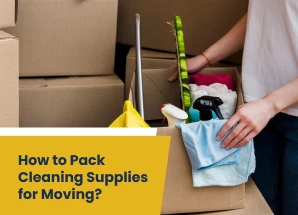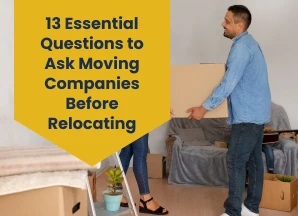Top 10 Pro Tips for Hiring Quality Movers

Moving is often cited as one of life's most stressful events. Between decluttering, packing boxes, and navigating logistics, it's easy to feel overwhelmed. But fear not, weary traveler! Hiring quality movers can be your knight in shining armor, transforming your relocation into a smooth (and dare we say, enjoyable?) experience.
But why hire professional movers at all?
- Save your sanity (and your back):Lifting heavy furniture and boxes is a recipe for disaster. Movers are trained professionals who can handle the grunt work efficiently and safely, leaving you free to focus on the fun stuff (like planning your new digs).
- Time is money:Packing, loading, unloading...it all takes precious time. Movers work quickly and efficiently, minimizing disruption to your busy schedule.
- Peace of mind:Accidents happen. Reputable movers offer insurance to protect your belongings, giving you peace of mind during transit.
Now, let's equip you with the knowledge to find the perfect moving crew:
Q&A with the Movers:
- Experience:Ask about their years in business and specific expertise in moves similar to yours.
- Licensing and insurance:Ensure they are licensed and insured, and understand the coverage options they offer.
- Estimates:Get in writing and clarify what's included (packing, loading, unloading, etc.). Beware of suspiciously low quotes, they often hide hidden fees.
- Complaints:Check their record with the Better Business Bureau (BBB) or online review sites.
Unmasking the Reliable:
- Website and presence:A professional website and active social media accounts are good signs.
- References:Request and follow up on references from past clients.
- Estimator visit:A thorough in-person walkthrough, not just a quick phone call, demonstrates commitment and accuracy.
Logistics & Expectations:
- Moving date flexibility:Discuss your preferred date and ask about their availability and potential peak season pricing.
- Inventory:Create a detailed list of your belongings to ensure accurate estimates and avoid surprises.
- Communication:Open communication is key! Clearly express your expectations and ask questions throughout the process.
10 Commandments of Mover Selection:
- Inventory is King: Get it done!
- Why: This seemingly mundane task is the foundation for an accurate estimate and smooth move. Think of it as a map for the movers, guiding them through your belongings and ensuring nothing gets lost in translation (or under a pile of boxes).
- How: Create a detailed list of your belongings, room-by-room if possible. Include descriptions, estimated weights, and note any fragile or valuable items. Remember, accuracy is key - underestimate, and you could face surprise charges due to additional volume; overestimate, and you might pay for space you don't need.
- Pro Tip: Utilize free online moving inventory tools or apps to streamline the process.
- Walk-through Wisdom: Let them assess your palace (and its treasures).
- Why: A phone call estimate is like judging a book by its cover - inaccurate and potentially disastrous. An in-person walkthrough allows the movers to assess your belongings firsthand, including accessibility challenges like narrow hallways or stairs.
- How: Schedule a walkthrough with representatives from the moving company. Be available to answer questions and guide them through your home. This personalized approach leads to more accurate estimates and avoids potential surprises on moving day.
- Pro Tip: Use the walkthrough as an opportunity to discuss any special requests or concerns you might have.
- Deposit Danger: No upfront payments! Pay once your belongings arrive safely.
- Why: Be wary of companies demanding hefty upfront deposits. Reputable movers typically require a small deposit or payment upon successful delivery. Large deposits could be a red flag.
- How: Read the contract carefully and understand the payment terms. If anything feels overly demanding, consider it a warning sign and inquire about alternative payment options.
- Pro Tip: Look for companies that offer "payment on delivery" or similar guarantees. This protects you from potential scams and ensures you pay only for the services rendered.
- Name Game: Beware of companies changing names to dodge complaints.
- Why: Some companies change names like chameleons to escape negative reviews or complaints. This makes it difficult to research their reputation and increases the risk of choosing a sub-par mover.
- How: Research the moving company thoroughly. Check their website, online reviews, and the Better Business Bureau (BBB) for any history of name changes or complaints. Look for consistency in their branding and ensure their online presence aligns with the name on the contract.
- Pro Tip: Ask the company directly about any past name changes and explain your concerns. A transparent and reputable company will readily address such inquiries.
- Reference Check: Past experiences predict future success.
- Why: Don't solely rely on the company's website testimonials. Ask for references from past clients, ideally those with similar move sizes and destinations. Contact these references via phone or email to get their firsthand accounts of the company's service and reliability.
- How: Be specific in your request for references. Ask for clients who moved around the same time as you plan to and whose move size was comparable to yours. This ensures the feedback is relevant to your situation.
- Pro Tip: Prepare a list of questions for your reference check, such as the responsiveness of the movers, the accuracy of the estimate, and any issues they encountered during the move.
- Packing Prowess: Do it yourself or pay extra? Consider your budget and time constraints.
- Why: Packing can be a time-consuming and physically demanding task. Consider your budget and available time. Packing yourself can save money, but it requires dedication and effort. Hiring professional packers ensures safe and efficient packing, especially for fragile or valuable items.
- How: Weigh the pros and cons of each option. If you're on a tight budget and have some extra time, DIY packing might be feasible. However, if you're short on time or have valuables you trust the professionals with, investing in packing services can be worthwhile.
- Pro Tip: Ask the moving company for packing quotes and compare them to the estimated cost of DIY packing materials and the value of your time. Choose the option that best aligns with your budget and priorities.
- Fee Fi Fo Fum: Watch out for hidden charges and surprise surcharges.
- Why: Beware of seemingly low quotes that later balloon due to hidden fees like long carry charges, stair fees, or fuel surcharges. Be upfront about any potential complications in your move, such as narrow hallways or limited parking, to avoid unexpected costs.
- How: Read the estimate and contract carefully. Ask clarifying questions about any listed fees or charges. Don't hesitate to walk away from a company that seems reluctant to provide clear and transparent pricing information.
- Pro Tip: Get quotes from multiple companies and compare them line by line to identify any hidden fees or discrepancies. Choose the company that offers the most transparent and comprehensive pricing breakdown.
- Blank Contract Blues: Avoid them like the plague! Get everything in writing.
- Why: A blank contract is a recipe for disaster. It leaves you vulnerable to potential changes in terms, pricing, or services without your consent.
- How: Ensure the contract clearly outlines the services provided, estimated costs, insurance coverage, payment terms, dispute resolution procedures, and your cancellation rights. Read it thoroughly, ask questions, and don't sign until you fully understand all its implications.
- Pro Tip: Consider consulting a lawyer or legal professional if you have any doubts about the contract's terms.
- "Guaranteed" Quote Gamble: Don't fall for it. Estimates can change based on unforeseen circumstances.
- Why: Be wary of companies offering suspiciously low "guaranteed" quotes. Moving estimates involve complexities like accessibility, weight variations, and unforeseen situations. A truly guaranteed quote might raise red flags about their business practices.
- How: Understand that estimates are based on best practices and approximations. Be prepared for some flexibility in the final cost and ask clarifying questions about potential factors that could affect the estimate.
- Pro Tip: Choose a company that provides a detailed breakdown of the estimate and explains how various factors could impact the final price.
- Speak Up if Issues Arise: Don't suffer in silence. Report any problems promptly.
- Why: Communication is key during a move. If you encounter issues like damaged items, missing belongings, or delays, don't hesitate to inform the movers immediately. Prompt reporting facilitates investigation, documentation, and potential insurance claims.
- How: Keep a clear record of any problems you encounter, including photos and written descriptions. Document the issue with the movers at the time of occurrence and follow up in writing to ensure they acknowledge your concerns.
- Pro Tip: Familiarize yourself with the company's claim procedures and insurance options before your move.
Bonus: Understanding Moving Insurance and Valuation Protection:
Choosing the right level of insurance is crucial to protect your belongings during the move. Here's a breakdown of two common options:
- Full (replacement) value protection: Reimburses you for the full cost of replacing damaged or lost items, ensuring complete peace of mind.
- Alternative level of liability: Offers limited coverage based on the weight of your belongings or a declared value per item. This option is generally more affordable but might not fully cover the replacement cost of valuable items.
Remember, choosing quality movers is an investment in your peace of mind and the safety of your belongings. By utilizing these tips and insights, you'll be well-equipped to navigate the moving process with confidence and minimal stress.
Moving can be a whirlwind of emotions, and amidst the packing, planning, and logistics, questions are bound to arise. Here's a comprehensive FAQ to address your top concerns and help you navigate the moving process with confidence:
Cost & Budget:
- How much does a moving company cost?
This depends on several factors, including distance, volume of belongings, services requested, seasonality, and insurance options. Expect a range of quotes, with the average cost falling between $2,000-$5,000 for long-distance moves.
- What's included in the moving cost?
Be sure to clarify what's covered in the estimate. Basic services might include packing, loading, unloading, and transportation. Additional services like packing materials, furniture disassembly/assembly, and specialty packing for fragile items can incur extra charges.
- What are the most expensive times to move?
Summer and holidays are peak season, with higher demand and potentially higher prices. Consider flexible dates or moving during off-peak times for potentially better deals.
- Do moving companies offer discounts?
Yes! Seniors, military personnel, AAA members, and students often qualify for discounts. Be sure to inquire about available promotions and eligibility requirements.
- Why should I get at least three quotes?
Comparing quotes from multiple companies helps you understand the market value and choose the best option for your budget and needs. Don't settle for the first estimate you receive!
Licensing & Verification:
- How do I check a moving company's U.S. DOT number?
Visit the Federal Motor Carrier Safety Administration (FMCSA) website (https://www.fmcsa.dot.gov/) and enter the company's DOT number to verify its licensing, insurance, and complaint history.
Tipping & Etiquette:
- Should I tip the movers?
Tipping is customary but at your discretion. Excellent service deserves appreciation. Consider factors like the complexity of your move, the movers' professionalism, and your overall satisfaction.
Preparation & Moving Day:
- How do I prepare for a moving company?
Declutter ruthlessly, pack efficiently, label boxes clearly, and disassemble furniture if needed. Ensure clear access to your home and provide parking instructions for the moving truck.
- What should I do while the movers are moving?
Relax! Take care of any last-minute errands or packing, offer refreshments to the movers if desired, and answer any questions they may have.
Restrictions & Exclusions:
- Is there anything the movers won't move?
Yes, movers typically have restrictions on hazardous materials, flammable liquids, plants, pets, and perishable items. Make alternative arrangements for these items.
Bonus Tips:
- Research moving companies thoroughly: Read online reviews, check licenses and insurance, and ask for references.
- Communicate openly and clearly: Keep the movers informed of any changes or special requests.
- Be prepared for unexpected delays: Traffic, weather, and unforeseen circumstances can happen. Stay flexible and patient.
- Enjoy the process: Amidst the chaos, take a moment to appreciate the new chapter you're embarking on!
Remember, informed planning and clear communication are key to a smooth and successful moving experience. By utilizing these tips and addressing your concerns, you can conquer the challenges and embrace the excitement of your relocation!
Ready to Move On Up?
With these tips and insights, you're well on your way to a smoother, stress-free move. Remember, choosing quality movers is an investment in your peace of mind and the safety of your belongings. Now go forth and conquer that relocation with confidence!
FAQ'S
Q1.What is address fraud and how can you avoid it?
Answer:Address fraud is a scamming action where the scammer uses a false or misleading address for illegal activities, such as stealing mail, circumventing legal responsibilities, or engaging in identity theft. Many illegitimate moving companies use fake addresses to mislead customers.
There are a few ways to avoid the address fraud-
Q2.How can you avoid getting scammed by movers?
Answer: Moving companies can scam in many ways and these scams can result in a dreadful moving experience. But if you know about the moving scams, you can avoid them. Check out this link to learn about all the moving scams and different ways to avoid them- https://www.vanlinesmove.com/blog/moving-scams-learn-how-to-avoid-them.
Q3.Is providing consent mandatory for purchasing services?
No, providing consent is not mandatory for purchasing services. You can buy any property, goods, or services without giving consent. This ensures that your decision to provide consent is entirely voluntary and not a prerequisite for making a purchase.
Q4.What options does a mover have under full (replacement) value protection?
Answer:With Full Value Protection, your mover is responsible for the replacement value of lost or damaged goods in your entire shipment. If any of your items are lost, destroyed, or damaged during the move, your mover will offer to do one of the following for each item:
Q5.How long does a mover have to resolve my claim?
Answer:Federal regulations mandate a timeframe for movers to address claims under full value protection, but the exact resolution time can vary depending on multiple factors.
- Thoroughly verify the company credentials by checking their licenses and registrations with authoritative bodies. Also, check online reviews about the company.
- Plan a physical visit to the mentioned address. If your mover is legitimate, they will have a permanent address rather than a temporary setup.
- Don't miss red flags like unmarked delivery vehicles or inconsistent contact information.
- Use Address Verification Services that can validate the authenticity of an address.
- Regularly review your credit reports and accounts for any unexpected address changes.
- Repair the damaged item.
- Replace the item with another one that has comparable value.
- Pay for the cost of repair for the said item (damage) or pay its current market value (total damage or loss).
- Acknowledgment- The mover has 30 days to notify you that they've received your claim after you file it.
- Resolution Timeline: They legally have 120 days to either resolve your claim (through repair, replacement, or cash compensation) or reject it with a written explanation.
Categories
- Long Distance Moving150
- Local Moving117
- Commercial Moving40
- Residential Moving32
- Last – Minute Moving25
- Furniture Moving9
- Moving Cost Calculator5
- Moving services5
- state to state movers4
- Piano Moving3
- Car Transportation3
- Truck Rental3
- Moving Cost3
- moving tips3
- Local Move3
- Moving companies3
- best moving rates3
- cheap moving companies3
- affordable moving companies3
- Junk Removal2
- Senior Moving2
- Senior Relocation Moving Companies2
- Moving Tools2
- Moving Estimates2
- interstate moving2
- full-service movers2
- Heavy Equipment1
- Moving Container1
- Senior Moving Services1
- office moving1
- office relocation1
- employee relocation1
- Car Transport1
- Vehicle Shipping1
- Car Shipping Services1
- Artificial Intelligence1
- Office Moving Services1
- Commercial Moving Companies1
- Corporate Moving Services1
- Corporate Movers1
- full-service moving companies1
- sustainable moving companies1
- green movers1
- Moving in US1
- Best places to move in 20251
- 2025 moving1
- Full-Service Moving Companies1
- Moving1
- Tips for moving1
- donate1
- sell1
- Movers in California1
- Movers in Studio City1
- Moving to California1
- Laws about Moving into California1
- Moving Laws1
- packing1
- cross-country move1
- cheap moving ways1
- Moving guide1
- Household moving1
- move out cleaning1
- right packing supplies1
- pack while moving1

 Local Movers
Local Movers Last-Minute Movers
Last-Minute Movers Junk Removal
Junk Removal Long Distance Movers
Long Distance Movers Piano Movers
Piano Movers Heavy Equipment
Heavy Equipment Commercial Movers
Commercial Movers Moving Container
Moving Container Car Transportation
Car Transportation Furniture Movers
Furniture Movers Truck Rental
Truck Rental Moving Cost Calculator
Moving Cost Calculator Moving Planner
Moving Planner Packing Calculator
Packing Calculator Moving Checklist
Moving Checklist Moving Insurance
Moving Insurance FAQ
FAQ Contact Us
Contact Us Moving Loan
Moving Loan About Us
About Us












